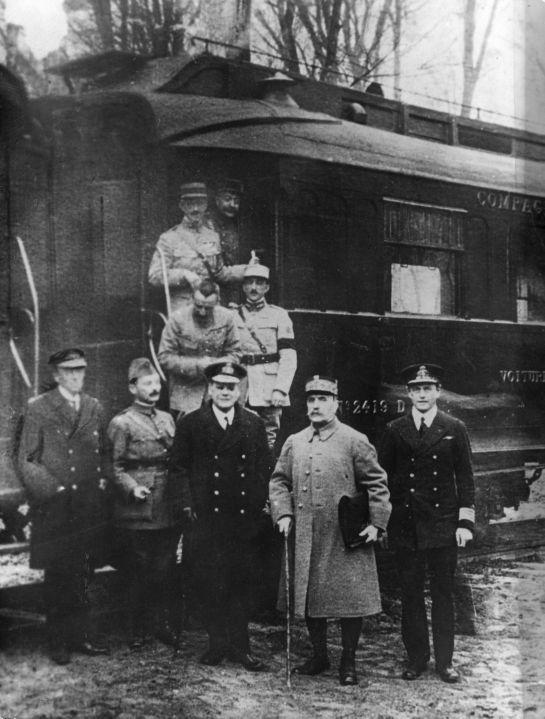 After over four years of war, in the Autumn of 1918 the forces of the Central powers began a slow retreat from the Western Front following a series of Allied advances. The German troops still engaged in strong rearguard actions and the occasional counter-attack. Nevertheless, the situation looked hopeless for the Germans as their allies in the other theatres of the Great War.
After over four years of war, in the Autumn of 1918 the forces of the Central powers began a slow retreat from the Western Front following a series of Allied advances. The German troops still engaged in strong rearguard actions and the occasional counter-attack. Nevertheless, the situation looked hopeless for the Germans as their allies in the other theatres of the Great War.As winter approached the German high command were faced with two choices, annihilation or surrender. They chose the latter option and decided to bring matters to a swift conclusion in order to prevent an impending revolution. On 7th November, the acting commander in chief of the German forces, Paul von Hindenburg, sent a telegram to the supreme commander of the Allied armies, General Ferdinand Foch, requesting a meeting.
Allied troops escorted the German delegation in the five staff cars across the border before joining a train to travel to their secret destination: Foch's railway carriage in Compiègne Forest, northern France. The representatives of the Allies were in no mood to negotiate. The three days of discussion centred on their terms of surrender, to which the Germans only managed to achieve a few minor modifications and to officially register their protest at the harshness of the terms.
Following the abdication of their Kaiser the day before and the failure of a last-ditch effort to stall the process, at 5am on the 11th November 1918, the German representatives signed the Armistice document. The ceasefire came into effect at 11am that day, now known as "the eleventh of the eleventh of the eleventh." The belligerents settled the final peace accords the following year at the conference in Paris that resulted in the Treaty of Versailles.
The text of the Armistice document is available on Wikisource.
Related posts
Treaty of Paris signed: 10th February 1763
Treaty of Brest-Litovsk: 3rd March 1918

Adolf Hitler had that car destroyed when it looked like the war was not going to end well for him.
ReplyDeleteWhat a beautiful post on this very special day.
ReplyDeleteFor all those young men and women (the vast majority in their teens and early twenties), who spent the most frightening of their days and nights most of which were injured, maimed or killed ...
'We will remember them.'
If ever there was a war that should never have been fought the Great War was it. So many lives destroyed over a few feet of soil ... it was so wrong.
Thanks for the comments.
ReplyDeleteMike: I am not sure whether Hitler ordered the destruction of the carriage. I know that following the Normandy landings the carriage was removed to Germany where it was eventually set ablaze as the allies approached.
When I was a child I went to Compiegne and saw the reproduction coach.